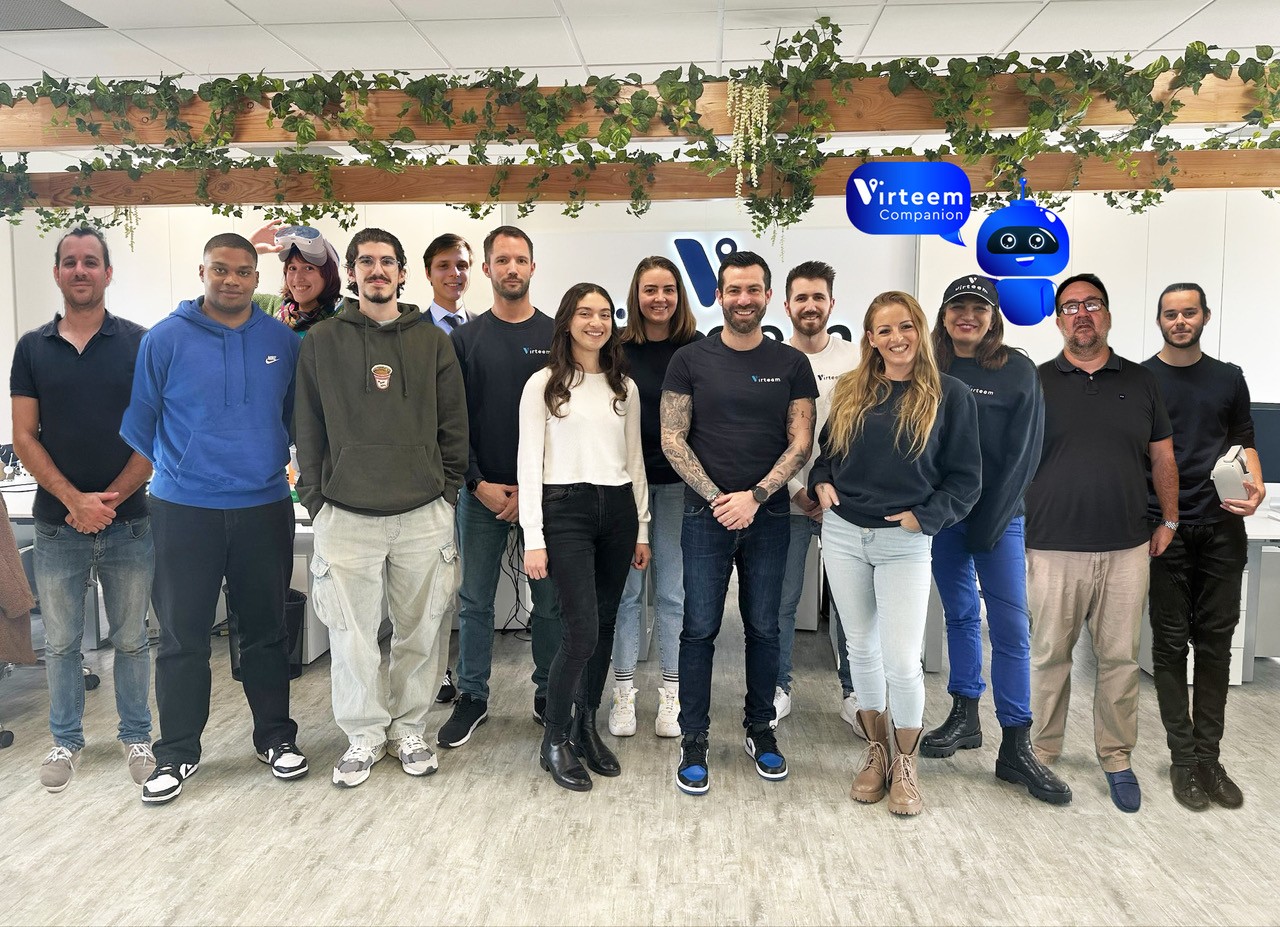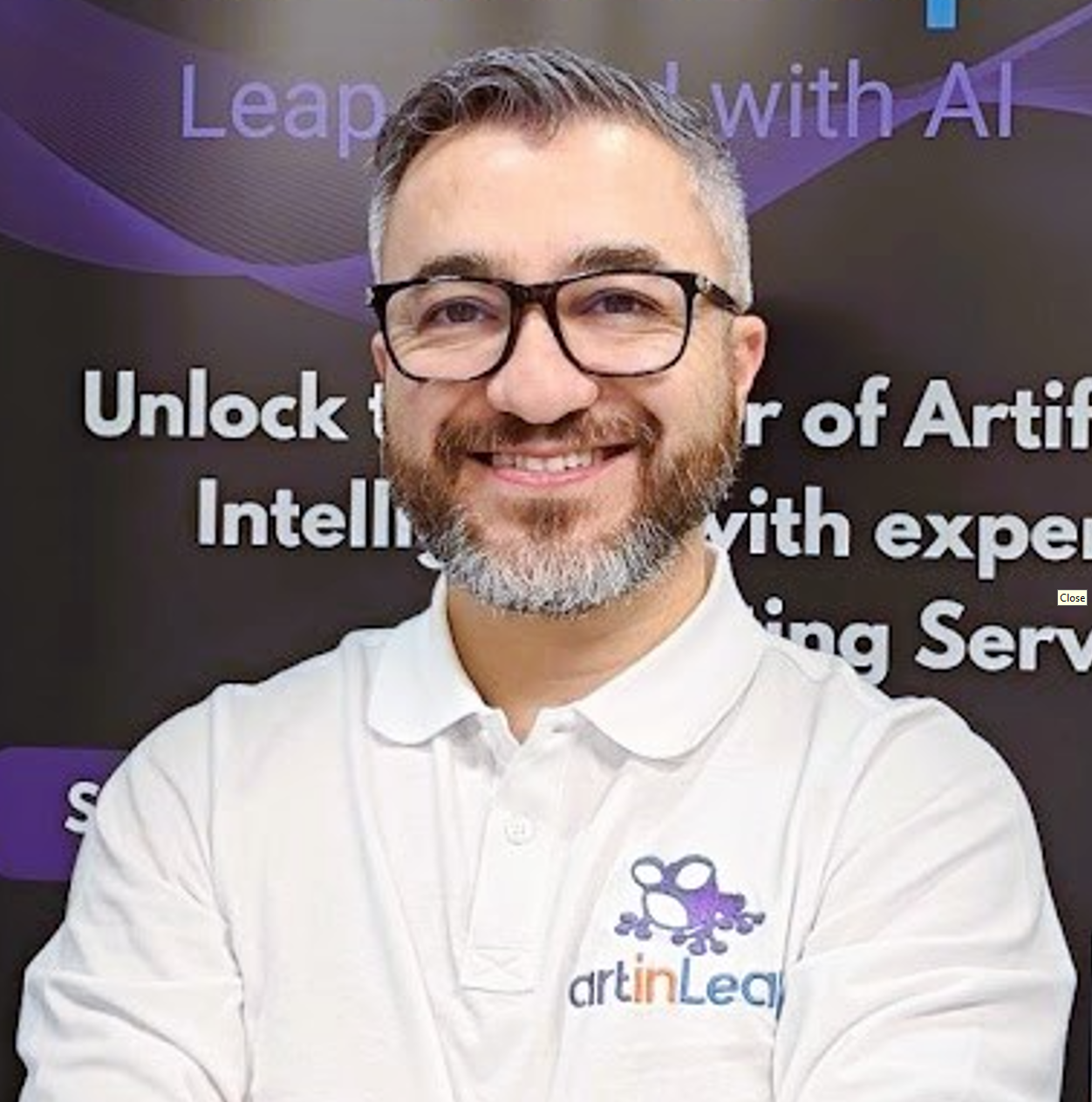Interview with Kevin Soler, CEO of Virteem, for #EntrepreneurIA
Interview conducted by Pascale Caron
Virteem is based in Sophia Antipolis and specializes in artificial intelligence, virtual tours and reality, 3D, and the metaverse. The company recently made a strategic shift toward generative AI. Under the leadership of Kevin Soler, they developed Virteem Companion, an intelligent digital assistant designed to centralize and analyze company documents.
Let’s start with an introduction to your business and what led you to implement AI in the company.
In 2012, we founded Virteem, a company specializing in virtual reality. Two years later, in 2014, we took a big step by opening 65 retail locations across France.
In 2019, Virteem was shaken by an internal crisis. I bought out my partner’s shares, and within two years, I managed to turn the situation around. The COVID period worked in our favor. Physical restrictions created a demand for virtual spaces. Schools were looking to organize virtual open days, while businesses needed solutions to keep functioning without in-person gatherings. Digital platforms reinforced this sense of belonging, and by 2021, Virteem was back on its feet.
However, this wasn’t without challenges: we had to make up for lost time, renew our teams. At that point, I started to think more deeply about knowledge transfer within the company. “If tomorrow, Virteem were to grow tenfold, what would we be missing? What are we doing inadequately today?”
After nearly ten years of running my company, I wanted to go further and take risks. So, I asked my teams, “If we had to accelerate, what tool would we need to do so?”
How did you approach this reflection?
We explored several approaches, from Kanban to team-building sessions. Ultimately, one observation stood out: whether in technical, sales, or administrative teams, a recurring need was access to the company’s internal knowledge. This ranged from practical questions like “How do I get a new badge for the cafeteria?” or “What software do we use to track projects?” to more strategic inquiries like “Have we already responded to a similar request for proposal?”
So, it was this need to structure internal knowledge that led you to artificial intelligence?
One day, a team member said, “We’re technicians, and we really believe in AI. We’ve been talking about it for two and a half years, and it’s truly the future.” I had vaguely heard of a few concepts, but I asked them to present some ideas. They convinced me of the value of having a system where all the data would be centralized, rather than manually searching for it like on Google.
So, we launched the project, and after six months of development, we had a first version. The result was fairly basic and not very aesthetic, but very functional for internal use. For example, when I had to respond to a request for proposal, I could ask our AI, “What is our CSR policy?” and it would give me the exact text I needed.
I set two conditions for the team: first, the AI should not distort the information, unlike other systems like ChatGPT. Secondly, the tool needed to be efficient enough to become indispensable for daily use, regardless of the department. We tested it internally, and it was a true revolution. Today, this tool is central to how we manage knowledge at Virteem.
And even though we’re a small company, I didn’t want our data to be exposed. I asked my teams to find a solution that would keep everything based in France and comply with as many regulations as possible. At the time, they didn’t really exist yet. But things have evolved. We now have the AI Act, ISO 42001, and we aligned ourselves with these standards. In fact, I went further and asked a simple question: “Does this issue concern only our company or others as well?”
A McKinsey study shows that employees spend an average of 1.8 hours per day searching for internal information, which represents about 19.8% of their work time. What’s dramatic is that these figures don’t account for the time lost asking colleagues for help, interrupting their tasks, and then getting back to work.
How did you react to this data?
1.8 hours wasted each day was enormous, especially in France where the daily work time is often around seven hours. So, we started to think about the impact this could have on our own productivity. We calculated the return on investment (ROI) of our project internally. Of course, we didn’t achieve 1.8 hours of savings since our processes are more agile than those of large companies, but we still saw a significant improvement.
Then, one day during a conference where I was a guest, I found myself at a round table with clients in the insurance and energy sectors. They asked me about our best practices internally. I told them about our tool, and they asked if we could sell them the system. When I got back, my teams and I analyzed what it would take to make this tool commercial. We then launched a new development phase that lasted just over a year.
And you recently started selling it, correct?
Yes, in September of this year. I brought on Dr. Héloïse Maurel, who is our CTO and oversees the entire AI offering. Today, we have several clients using our solution, such as Crédit Agricole. They use it in very similar contexts to what I’ve described.
Our greatest differentiator is our approach to data sovereignty. We’ve done everything to ensure that Virteem Companion fully complies with French and European regulations, which is a huge challenge. In France, only one provider is capable of offering CPUs at scale for this type of service, and that’s OVH.
Is that a significant challenge compared to other international players?
We are not competing on a level playing field with the Americans, who develop similar systems without concern for data sovereignty and with much larger fundraising capabilities. They are also subject to far fewer legal constraints, allowing them to adopt changes more quickly.
Europe, in one way or another, will need a competitor to the GAFAMs in these areas, as none currently exist. It’s a complex, underfunded market but absolutely necessary to ensure our technological sovereignty on a European scale.
What AI solutions do you use at Virteem?
We’re not going to redevelop LLMs—it doesn’t make sense. They cost tens or even hundreds of millions to create and train, and it takes a lot of time. That’s where Mistral comes in. We’ve chosen this model: we use it in open source and host it at OVH to remain sovereign. Then we add a whole set of complementary elements to ensure it meets our specific use cases.
We have a proprietary dataset to train the AI. There’s also a data security system and compartmentalization between clients for model training to avoid biases or deviations.
How did you overcome the cultural and human challenges when integrating AI?
In reality, it was my teams who proposed the idea. The average age here is 23, so they’re naturally much less resistant, even though they’re aware that some jobs could be replaced by AI in a few years. In fact, one of my clients is currently testing a POC of Virteem Companion, and the goal is to eliminate an entire BU (Business Unit) if the test proves successful.
We are moving towards major changes. For example, I much prefer interacting with an AI that understands me and responds clearly, rather than wasting time with an ineffective telemarketer. Humans will focus on higher-value tasks, while repetitive actions will be automated. I deeply believe in the idea that humans can improve AI, but even more in AI amplified by humans.
**For me, AI even has creative potential, though I’m still attached to human art. I’m a photographer and enjoy going to extreme places, like sleeping by a lake in the Mercantour to capture a moment. Sure, AI can generate a beautiful image, but it doesn’t replace that experience. For music, I’ve listened to compositions made by AI, and honestly, there are interesting elements to build on.
It’s a tool. When people tell me they’re afraid it will make the new generation “dumber,” I disagree. Using intelligent processes to accomplish repetitive tasks doesn’t make us dumber; on the contrary, it’s a way to optimize our time. Have I become “stupider” by surfing the Internet instead of flipping through a paper encyclopedia? No, it’s just a different method.**
What technical challenges has Virteem encountered in implementing AI for you and your clients?
For us, it’s primarily pure research. We constantly have to experiment to find the best building blocks to assemble and create relevance. A general-purpose AI that can do everything and do it well doesn’t exist. We need specialized solutions for each use case. We had to design these solutions.
For our clients, especially large companies, the data is there, but it’s often scattered across different units and rarely reprocessed. There’s also a lack of standardization in managing these AI projects. Sometimes it’s the IT department in charge, or the business units, or innovation. This creates a lot of complexity.
What advice would you give SMEs hesitating to embrace AI?
I would say: “No preconceived notions,” because they kill innovation. AI is not here to replace humans but to make our lives easier, to make our processes smoother and more efficient. It’s a tool that helps us accomplish tasks we couldn’t do as quickly or as accurately without it.











